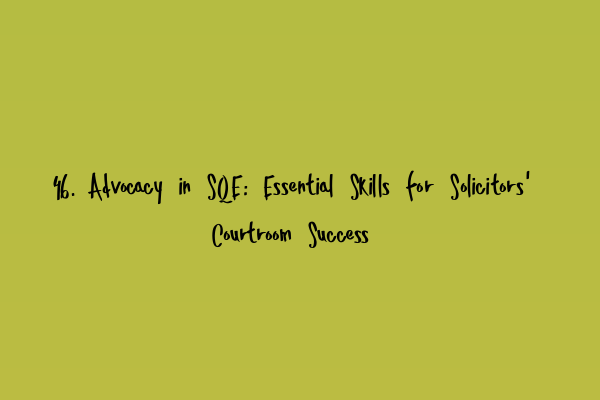46. Advocacy in SQE: Essential Skills for Solicitors’ Courtroom Success
Advocacy is a critical skill that every solicitor must possess in order to excel in the courtroom. In the Solicitors Qualifying Examination (SQE), advocacy plays a significant role in assessing a candidate’s ability to represent clients effectively. In this article, we will explore the essential skills required for advocacy success in the SQE and provide valuable tips on how to enhance your courtroom performance.
The SQE assesses a candidate’s competence in various legal practice areas, including advocacy. Advocacy skills are essential not only for courtroom trials but also for negotiations, oral submissions, and client representation. As a solicitor, your ability to articulate arguments persuasively and present complex legal concepts in a concise and coherent manner can greatly impact the outcome of a case.
Developing Effective Advocacy Skills
To excel in advocacy, solicitors need to develop a set of fundamental skills and techniques. These skills can be honed through practice and training, and continuous improvement is crucial for success. Here are some key skills to focus on:
1. Communication Skills – Good communication is at the heart of effective advocacy. Solicitors must be able to convey their arguments clearly and convincingly to the judge, jury, and opposing counsel. Developing strong verbal and non-verbal communication skills, such as body language and tone of voice, can significantly enhance your advocacy performance.
2. Preparation – Adequate preparation is the cornerstone of successful advocacy. Before any courtroom appearance, solicitors must thoroughly research and analyze their case, gather evidence, and construct persuasive arguments. Understanding the relevant legal principles and precedents is essential for presenting a compelling case.
3. Legal Knowledge – Advocacy requires a thorough understanding of the law. Solicitors must stay abreast of legal developments, case law, and regulatory changes relevant to their practice areas. Continuous legal education and keeping informed about recent judgments are crucial to providing accurate and persuasive legal arguments.
4. Confidence – Confidence is key to effective advocacy. It allows solicitors to present their case with conviction and credibility. Building confidence can be achieved through practice, experience, and adopting a positive mindset. Engaging in public speaking, mooting, and mock trials can also help boost confidence levels.
5. Listening Skills – Active listening is a vital skill for solicitors. By attentively listening to witnesses, clients, and opposing counsel, solicitors can gather crucial information and identify key points to address in their advocacy. Effective listening also helps in adapting arguments and addressing counterarguments in real-time.
6. Courtroom Etiquette – Understanding courtroom etiquette is important for solicitors to maintain professionalism and credibility. Familiarize yourself with the protocols and practices of the court you are appearing before. Proper attire, respectful demeanor, and adherence to procedural rules are essential for courtroom success.
7. Resilience – The ability to handle challenges, setbacks, and pressure is vital for advocacy success. Solicitors must stay resilient in the face of difficult situations, opposing counsel’s arguments, and unexpected hurdles during the court proceedings. Developing resilience through practical experience and training can help solicitors navigate through demanding courtroom situations with composure.
Enhancing Advocacy Skills for the SQE
The SQE aims to assess a solicitor’s ability to perform in a realistic legal context. To enhance your advocacy skills specifically for the SQE, consider the following tips:
1. Practice Past Exam Questions – Familiarize yourself with past SQE exam questions and practice answering them under timed conditions. This will help you become comfortable with the format and structure of the advocacy questions.
2. Utilize Mock Exams – Taking mock exams, both online and in-person, can simulate the exam-day experience and help you gauge your performance. Consider participating in SQE 1 Practice Exam Questions and SQE 1 Practice Mocks FLK1 FLK2 to get hands-on experience.
3. Join Advocacy Workshops – Participating in advocacy workshops and training sessions can provide valuable insights and feedback on your performance. These workshops often offer opportunities to engage in practical advocacy exercises and receive expert guidance.
4. Take Preparation Courses – Enrolling in SQE 1 Preparation Courses and SQE 2 Preparation Courses can help you develop a comprehensive understanding of the advocacy skills required for success. These courses provide structured guidance, study materials, and expert-led sessions.
5. Stay Updated on Exam Dates – Regularly check the SRA SQE Exam Dates to ensure that you are aware of the registration deadlines and exam timetables. Being well-informed about the exam schedule enables you to plan your preparation effectively.
Conclusion
Advocacy skills are indispensable for solicitors’ courtroom success. The SQE assesses these skills to ensure that solicitors are well-equipped to represent their clients effectively. By focusing on developing effective communication, preparation, legal knowledge, confidence, listening skills, courtroom etiquette, and resilience, solicitors can enhance their advocacy skills and increase their chances of success in the SQE.
To further enhance your preparation for the SQE, consider utilizing SQE 1 Practice Exam Questions, SQE 1 Practice Mocks FLK1 FLK2, SQE 2 Preparation Courses, SQE 1 Preparation Courses, and staying updated on SRA SQE Exam Dates.
Remember, effective advocacy goes beyond passing an exam. It is a lifelong skill that will contribute to your career as a successful solicitor. Put in the effort, practice regularly, and continuously strive for improvement, and you will excel in advocacy and courtroom representation.
